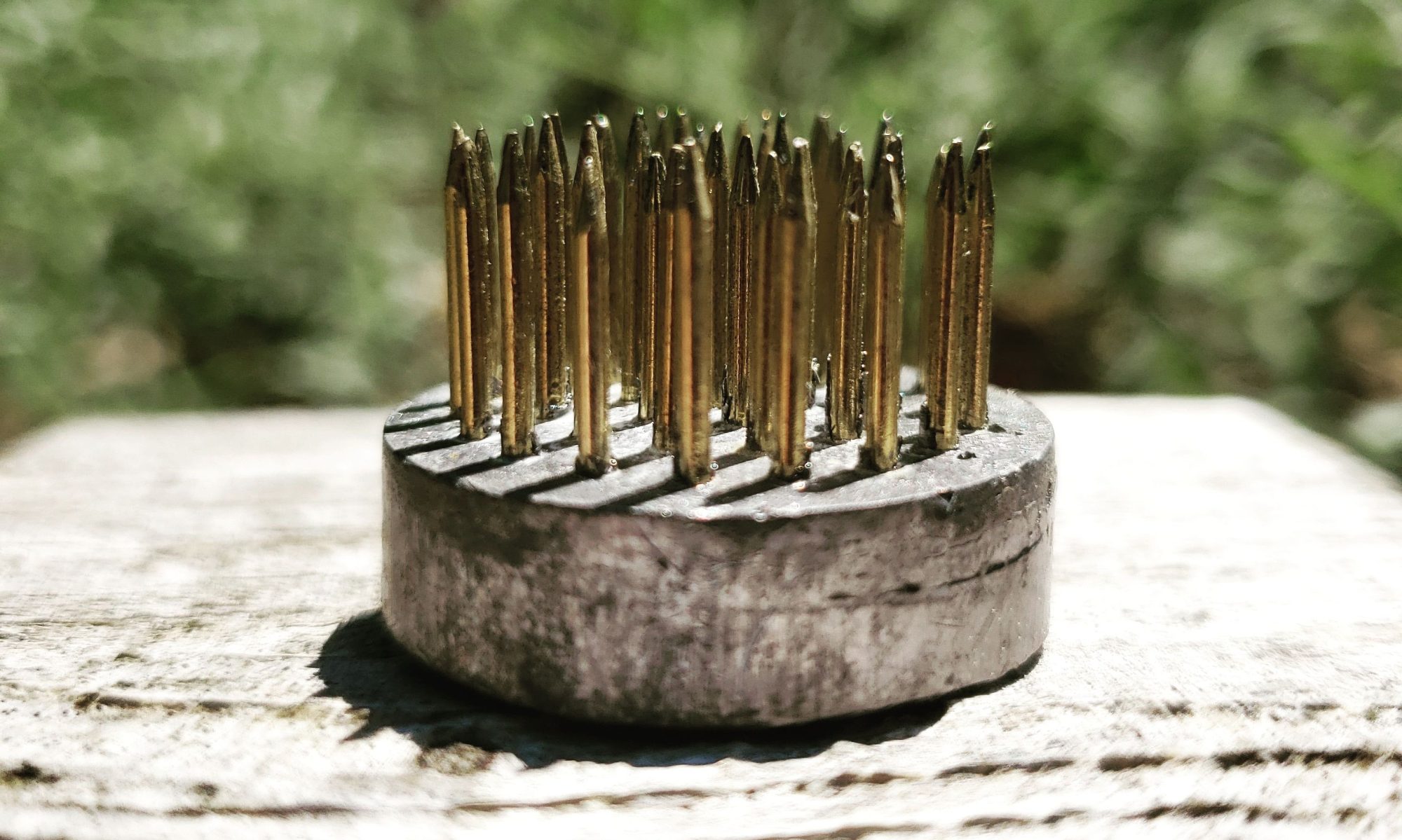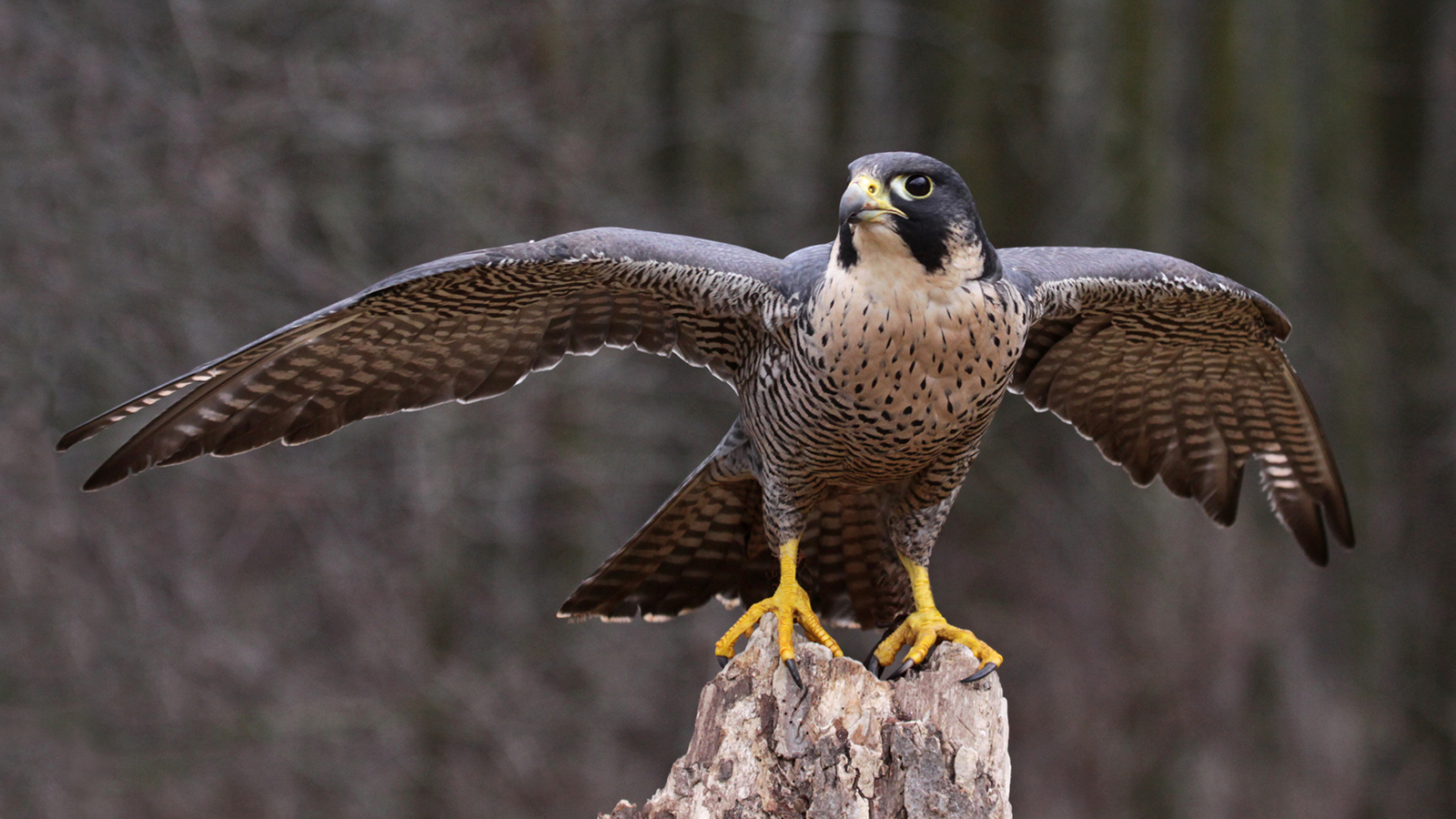This essay appears in the anthology Wildness: Voices in the Sacred Landscape, published by Homebound Publications, copyright 2016.
But whether it was a bird of prey
Or prey of bird I could not say
~Robert Francis
My husband calls me from upstairs. Hurry. Quick. Look out the window. Do you see it?
The front yard slopes toward the road, about thirty feet from the house. The blacktop of our driveway, and a low gray rock wall give way to a grove of trees, a blend of grey bark, brown earth, and the pale paper of lingering beech leaves. Thinned out in late autumn, the laurel trunks twist and spread their muted and monotone still-green foliage. A weathered stump and the lamp post are the only variables. Eric is pointing, directing my eyes, which see only the tessellation of space between laurel branches. There, behind the light, scan just to the right. The low branches. Do you see it? I have to find the movement with my eyes before I put the binoculars to work. He’s told me by this time what I’m looking for—a peregrine falcon and its kill.
It’s the junco’s white belly that alerts me first. Shredded white feathers scatter—emptying as if from a torn pillow—scatter, not falling to the ground but filling the space around the two birds. By the time we’ve repositioned ourselves at the second floor window, she’s flown to a higher branch, a vantage point better for our view, and more stable, perhaps, for the harder work of flaying the junco’s breast, a better angle for the scalpel beak, leverage for talons. Through the binoculars, she is a giant, but the magnification diminishes her effort. She could not have carried her prey too much farther than the neighboring branch she decided on. Downy, with elegant grey plumage, she wears speckles and delicate brown dashes on a whitish underbelly. I’m surprised by how blue she is. The sky matches her with snow-worthy slate. At various angles, tawny cheeks and a black mask bob in steady motion, shielding the claw-clutched prey, instinctually hiding what no one else can have. Nothing else moves in the yard. She is at it for forty-five minutes. I am at a loss for words. By the time it’s over, all I have is the conviction that peregrine is more melodic (and I think) more accurate than falcon, and this is how she should be called. That may be all the precision my retelling can muster.
I wonder about this as I sit down to my notebook. The camera has failed in such unforgivable ways, and memory is doomed to be insufficient. What else do I have? The worlds outside our windows should be shared worlds. I want to preserve the episode for my future self, to recount it at family gatherings, tell my friends through social media. I want to brag. But the nature we experience through others will always come through a filter. I take this to heart. “There is nothing in which people differ more than their powers of observation,” wrote John S. Burroughs. As a nature lover, I cultivate my powers of observation. As a poet and teacher, I practice seeing and sharpen the senses by trying them out on paper. Like deciding to open the window or draw the shade, I deliberate on a point of view.
I told you about a junco, but it could have been a nuthatch, maybe the one I watched traipse down the oak this morning after insects which I haven’t bothered to name. The woods are filled with unnamed critters, some visible for mere seconds at a time. Most never surface from earth cover or give up their camouflage or grow big enough to be noticed. Notice matters; spectacle speaks. The peregrine is singular; the everyday birds multiply and seem interchangeable. I may be able to describe any one of them from memory, if I could only be sure of its pedigree or be able to scan the table of contents of its daily migrations. As the peregrine’s anonymity vanishes into a declaration of authority, the victim becomes just another white bellied meat source. That’s one way of telling it. When I shift my vantage point, the quarry becomes small and delicate, slow, uncoordinated. A junco with its own story, its own beauty. Its black eyes pierce a cozy landscape of forests and food; a feed stop offers suet and kibble. A shadow passes; there is no escape. I hold my breath because I don’t want to disturb the moment. I exhale, and I’ve already altered it.
Any snapshot is filtered by the viewer’s eye and a lifetime of other sights. I do not intrude. Or do I? Our choice of words matters so much and we must consider them as we would territorial boundaries. If I say surveillance, do I imply deviance? If I chose bird’s eye view, do you applaud my attention, or mock my sarcasm? If I say hollow bones rather than banked blood, which is accurate? When staving off hunger wins out over lunch time, the value of one sunflower seed, one unlucky bird, goes up like a sprinkler in a year of drought. The actions I describe can never be neutral, and you are always in my line of sight. Phrases like habitat loss echo through the woodlands like the tapping of beaks. Survival of the fittest signals the surrender of tree mites and dormant caterpillars. And juncos. As literate creatures, we hold much in our hands, the language of fight and of flight. The natural world—so vast and varied, so holy and violent—will one day disappear. We will all fade into the sepia print of the past. The endurance that nature teaches us is what we have to bear the loss. It may seem a small thing, but the way we catalog what we see can shape the extent of our preservation and shape our ability to heal and honor, celebrate and remember. It is an earned privilege—the naturalist as chronicler. If I say watcher, do you think witness? If I say prey, do you hear prayer?
Peregrine, from the Latin meaning “one from abroad.” A wanderer, one who migrates. The peregrine stands 15 inches and can spread its wings three and a half feet. Peregrines mate for life. Both parents tend their young. The peregrine can catch prey in flight and reach speeds of 240 miles per hour. I choose to tell you this. Do you see it? She has pierced the windpipe with her talons and killed the bird instantly. She is hungry. She will eat its bones. She is beautiful. I try to capture her, but she flies away. She is both my words, and beyond them.

